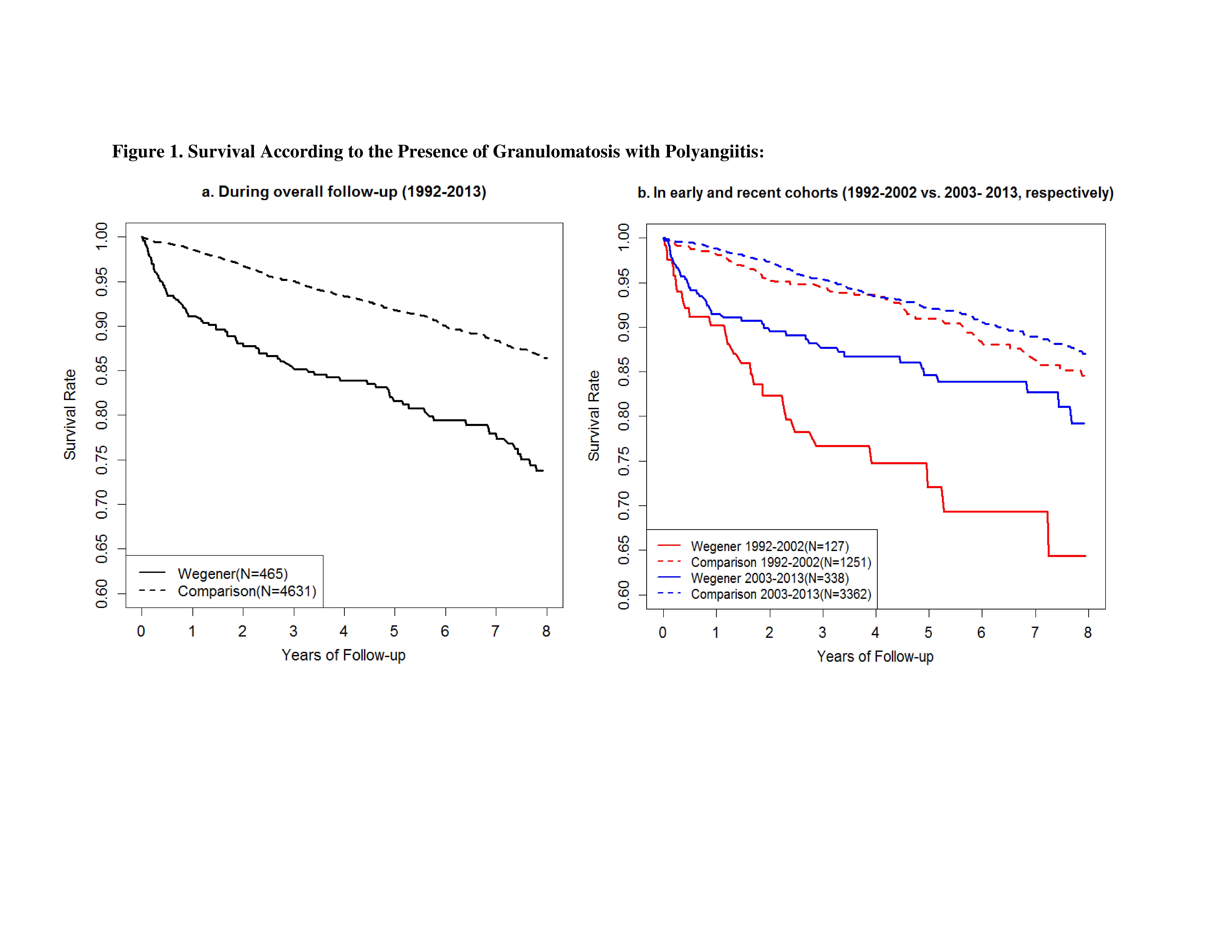Session Information
Date: Sunday, November 8, 2015
Title: Vasculitis I
Session Type: ACR Concurrent Abstract Session
Session Time: 4:30PM-6:00PM
Background/Purpose:
Granulomatosis with polyangiitis (GPA) is associated with an increased risk of
mortality. Advances in diagnosis and treatment strategies are thought to
improve outcomes in GPA. While prior reports estimate a standardized mortality rate
(SMR) of 2.1-4.8, recent GPA mortality trends in a general population context
are unknown.
Methods:
We
conducted a matched-cohort study using data from an electronic medical record
database representative of the UK general population, collected from 1992 to
2013. GPA was defined using Read codes for GPA. Cox proportional hazard
regression models were used to estimate the hazard ratio (HR) of mortality
among patients with GPA compared to sex-, age-, and entry time-matched non-GPA
individuals, adjusting for lifestyle factors, comorbidities, medication use,
and other potential confounders.
The cohort was divided into two sub-groups based on the year of
diagnosis (1992-2002 and 2003-2013) to evaluate changes in mortality with time;
these time periods were chosen based on the timing of publications between 2000 to 2003 studying the safety and efficacy of different
treatment strategies. We calculated the absolute rate difference using
an additive hazard model for the two sub-cohort follow-ups and tested the
additive interaction between GPA and time period.
Results:
We
identified 474 cases of GPA (average age 60.2 +/- 14.6 years; 52.1% male). The incidence rate of death (per 1000
person-years) in the GPA group was 43.5 (95% CI 35.4-52.9) compared to 19.3
(95% CI 17.6 to 21.0) in the control group, which resulted in a multivariate HR
of 2.5 (95% CI 1.9-3.3). Patients
with GPA were at the greatest risk of death in the first year following
diagnosis. There was no apparent difference in the mortality HR between males
and females and those older and younger than 65 years of age.
The early cohort (1992-2002) GPA patients had
considerably higher mortality rates than the recent cohort (2003-2013) patients
(72.0 vs. 35.7 cases per 1000 person-years), as compared with a moderate
improvement in mortality rates in the comparison cohorts between the two
periods (19.8 vs 17.0 cases per 1000 person-years, Figure 1). The HR for mortality was 4.34 (95%, 2.72-6.92)
in the early cohort in contrast to 2.41 (95%, 1.74-3.34) in the recent cohort
(p for interaction = 0.043).
Conclusion:
In
this large cohort representative of the UK population, we demonstrate that GPA
survival has improved considerably over the past two decades. This trend is
coincident with changes in management that minimized exposure to cyclosphophamide and emphasized earlier introduction of
steroid-sparing agents.
Figure
1: Survival According to the Presence of Granulomatosis
with Polyangiitis
To cite this abstract in AMA style:
Wallace Z, Unizony S, Lu N, Choi HK, Stone JH. Improved Survival in Granulomatosis with Polyangiitis: A General Population-Based Study [abstract]. Arthritis Rheumatol. 2015; 67 (suppl 10). https://acrabstracts.org/abstract/improved-survival-in-granulomatosis-with-polyangiitis-a-general-population-based-study/. Accessed .« Back to 2015 ACR/ARHP Annual Meeting
ACR Meeting Abstracts - https://acrabstracts.org/abstract/improved-survival-in-granulomatosis-with-polyangiitis-a-general-population-based-study/

